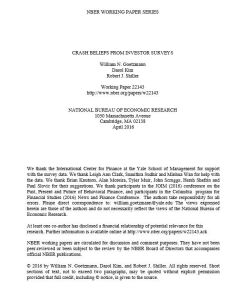Join getAbstract to access the summary!

Join getAbstract to access the summary!
William N. Goetzmann, Dasol Kim and Robert J. Shiller
Crash Beliefs from Investor Surveys
NBER, 2016
What's inside?
The odds of a one-day stock market crash are relatively low, but not according to investors.
Recommendation
One-day stock market crashes, such as those of October 28, 1929, or October 19, 1987, are historically rare. Interestingly, however, investor perceptions of the likelihood of such an event happening are far higher. Economists William N. Goetzmann, Dasol Kim and Robert J. Shiller seek to explain this discrepancy through an analysis of survey data that suggests the media play a powerful role in forming those opinions. The implications of their findings are important because these beliefs affect investors’ market involvement, the premiums they’ll pay for stocks and their risk tolerances. getAbstract recommends their insightful and thought-provoking report to investors and financial professionals interested in understanding the behavioral drivers of market volatility.
Summary
About the Authors
William N. Goetzmann is a professor of finance at Yale University. Dasol Kim is an assistant professor of banking and finance at Case Western Reserve University. Robert J. Shiller is a Nobel Prize winner and a professor of economics at Yale University.


























Comment on this summary